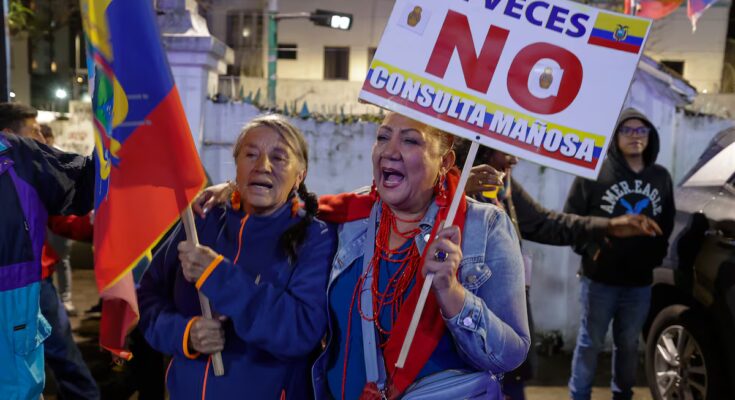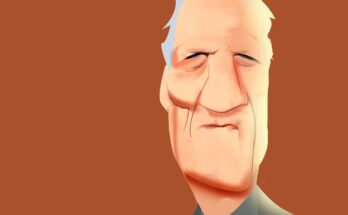The president of Ecuador, Daniel Noboa, suffered the first setback in his two years in office this Sunday. The conservative leader called 13.9 million Ecuadorians to vote in a consultation that ultimately aimed at a profound reform of the Constitution and the response was unexpected in its strength. Ecuadorians rejected the three questions posed by the referendum – which aimed to amend the Constitution to install foreign military bases, end state financing of parties or reduce assembly members – and were even firmer towards the popular consultation that gave a blank check to Noboa to rewrite a new constitutional text, the most decisive issue. “We consulted the Ecuadorians and they spoke. We respect the will of the people,” the president surmised in his X report after knowing the results. His next moves are uncertain.
These are the results. We consulted the Ecuadorians and they spoke. We kept what we promised: ask them directly. We respect the will of the Ecuadorian people.
Our commitment does not change; becomes stronger. We will continue to fight tirelessly for the country…
— Daniel Noboa Azin (@DanielNoboaOk) November 17, 2025
Citizens arrived exhausted at these votes, the third in just a year. And the seventh in just two. The day began with thousands of soldiers in the streets, neighborhoods and polling stations. The shadow of the explosive attacks that have shaken the country in recent weeks was very present and the enormous security operation transformed the elections into a new demonstration of state strength. More than 118,000 police and soldiers were deployed to guard the polls.
Around 10pm the result was almost definitive. He did not win in all the proposals. The question on military bases with 60.6%. The refusal to stop financing parties with public money reached 58% and the refusal to reduce the number of assembly members reached 53.4%. The last question and the most important for Noboa, the one that opened a constituent process, obtained the maximum failure with 61.6% of negative votes.
“This result leaves the government too cold. It was not at all what was expected.” For Luis Carlos Córdoba, researcher at the Ecuadorian Conflict Observatory, the result of the referendum highlights an Executive that has lost control of the country and which arrived at the consultation without a clear direction. The analyst argues that the president opened high-voltage political debates without detailing his purpose, which fueled citizen distrust: “This lack of clarity was exacerbated when the president proposed a Constituent Assembly without detailing what he intended to do with that extraordinary power,” he says. “When you don’t know who you’re giving that power to or what they’re going to do with it.”
One of the readings that analysts have made is that Noboa made a mistake in reading the popular will. In recent weeks there has been an effervescence on the streets that hasn’t been seen for years in favor of saying no to the referendum. “This awakening responds to Noboa’s authoritarian turn, which aroused enormous social resistance,” analyzes Córdoba. And among the most mobilized, the indigenous people stood out, representing almost 8% of the population. “It’s not something to celebrate, but we must have the peace of mind to assume that this victory belongs to the common people,” said indigenous leader Leonidas Iza. “We are here to work for 18 million citizens even for those who do not vote for us, because here we must leave hatred and work with love for this country”, celebrated Luisa González, former presidential candidate of the Revolución Ciudadana, the party of former president Rafael Correa, promoter of the last constitutional text of 2008.
Rewriting the Constitution has almost become a way of doing politics. Ecuador has had 20 constitutional texts since 1830. Each president has sought to fashion a new Magna Carta suited to his needs, in a cycle that repeats with surprising regularity: each Ecuadorian Constitution has lasted, on average, just over nine years. The convening of a constituent assembly does not seem to be an exception in the country, but rather part of a historical practice that governments have used to reorganize the political council in their favor. In Noboa’s case the result was failure.
Noboa’s entourage avoided interpreting the results as a setback. “Many politicians will want to take responsibility for the result, but it was the people who spoke. And this government is characterized by speaking directly to the people, without intermediaries,” said MP Andrés Guschmer, of National Democratic Action, Noboa’s party. “We will continue to seek legal means to bring peace, security and prosperity to all Ecuadorians,” he added, along the same lines as his boss.
The defeat, in any case, is still significant because Noboa maintains a solid popularity rating above 50%, and has maintained good relations with an Electoral Council that rarely annoys the Executive. However, the 13 days of campaigning were an uneven contest. The president distributed welfare aid, presented daily captured criminals, sought to protect himself with gestures of authority and even received a visit from US Security Secretary Kristi Noem, a sham that sought to project international support. None of this was enough to achieve his goal.
In the middle of the day, Caroline Ávila, like many analysts in the country, did not believe it was possible for the no to prevail on all four questions of the consultation. After examining the results with surprise, Ávila interprets “a deep distrust in the presidential voice”, fueled by the “management and communication errors” of the president himself and those around him during the campaign. According to the analyst, Noboa has accumulated contradictory decisions, confusing messages and a governing style that has undermined his credibility.
After the consultation there is a new question haunting Ecuadorians: what to expect from tomorrow? “Let the government begin to govern,” says researcher Luis Carlos Córdoba. “Because what he has done in the last two years is to live a democratic simulation, presenting many of them shows media, but without management based on public policies, not even in matters of safety”.



